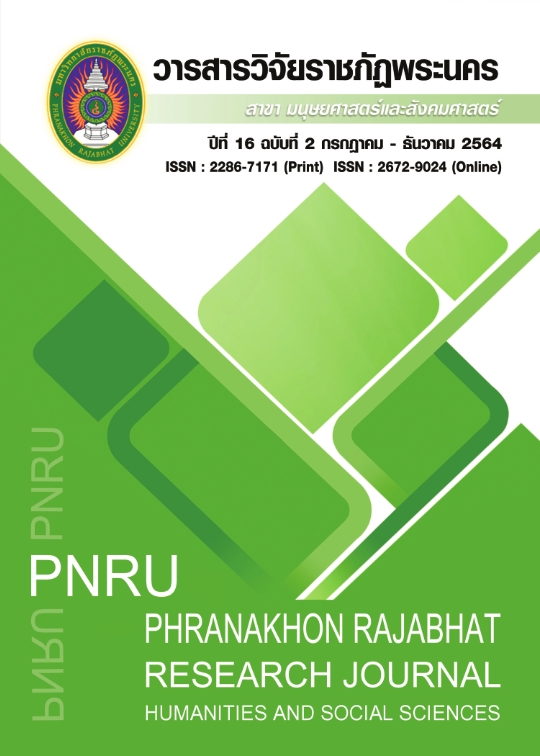THE PEOPLE’S ADAPTATION TOWARDS THE NEW NORMAL LIFESTYLE DURING THE COVID-19 PANDEMIC IN NONTHABURI PROVINCE
Main Article Content
Abstract
This research aimed to study people’s adaptation towards the New Normal lifestyle during the Covid-19 pandemic on the aspects of the economy, health, society and environment, IT usage, and education. The research utilized a Quantitative method. 448 households in Nonthaburi were multi-randomly selected to answer the questionnaires. The obtained data were analyzed by percentage and frequency. The results: In economic adaptation, 87.28% of the households did not create new occupations, 47.32% were affected in business operations, 80.11% got self-improvement by online learning, 87.05% cooked by themselves, 83.93% had a plan about money, and 62.50% had a plan about occupation. In health adaptation, more than 80% of the households always ate freshly cooked food, wore masks, and washed their hands with water and soap or alcohol gel. In social adaptation, 71.87% of the households participated in family activities whereas 50.45% participated in community activities decreasingly. In information technology adaptation, 47.10 of the households had self-learning about the use of communication devices. In education adaptation, 42.41 of the households never hired tutors for their children, and 21.88% managed family members’ time to teach or care for children.
Article Details

This work is licensed under a Creative Commons Attribution-NonCommercial-NoDerivatives 4.0 International License.
Each publish articles were copyright by Phranakorn Rajabhat University
Any contents which appeared in each articles in the journal were authors personal opinion. It did not relate to Phranakorn Rajabhat University and other instructors in the university. Each authors would take responsibility on their articles. If there are any mistake, the authors will take responsibility themselves
References
COVID-19 center Nonthaburi. (2020). Timeline COVID-19 patients in Nonthaburi. Retrieved December 10, 2020, from https://www.facebook.com/COVID19Nonthaburi.
COVID-19 center Nonthaburi. (2021). Statistic of COVID-19 patients in Nonthaburi : new pandemic destric view at March 18, 2021. Retrieved December 10, 2020, from https://www.facebook.com/COVID19Nonthaburi.
Department of Disease Control of Thailand. (2020). Covid-19 situation information report in Thailand. Retrieved December 10, 2020, from https://www.nrct.go.th/covid19/daily.
Department of Disease Control of Thailand. (2021). Practical guidance during prevention and control of COVID-19. Retrieved December 10, 2020, from https://ddc.moph.go.th/ viralpneumonia/file/ int operator23_050164.pdf.
Juntarabenkul W. (2020). Prevention of coronavirus disease 2019 (COVID-19). Documents for the 23rd Chula Seminar “Awareness is better than panic”: Learn and prevent coronavirus 2019. Department Of pediatrics, Faculty of Medicine, Chulalongkorn University.
Klaus Schwab. (2016). The Forth Industrial Revolution. World Economic Forum.
National Research Council of Thailand. (2020). Analysis of COVID-19 patients’ statistics for relieve anxiety. Retrieved December 14, 2020, from https://www.nrct.go.th.
National Geographic. (2021). Adaptation. Retrieved February 20, 2021 from https://www.nationalgeographic.org/encyclopedia/adaptation/.
National Statistical Office Thailand. (2020). Exploring the impact of the epidemic situation Covid-19 in the field of business establishments. Retrieved February 20, 2021 from http://ittdashboard.nso.go.th/img/covid/result_
COVID-Establishment.pdf.
PPTV Online. (2020). "Shrimp Market", the beginning of the covid epidemic. Retrieved December 4, 2020, from https://www.pptvhd36.com/news.
Siamrath. (2020). The timeline of Covid-19 towards World and Thailand situation. Retrieved December 4, 2020, from https://siamrath.co.th/n/148697.
Thaveelabpunthong W. (2020). Covid-19 changes consumer behavior using more technology in everyday life. Retrieved February 20, 2021 from https://www.infoquest.co.th/2020.
Worldometer. (2021). Covid-19 Coronavirus pandemic. Retrieved December 4, 2020, from https://www.worldometers.info/coronavirus/.


